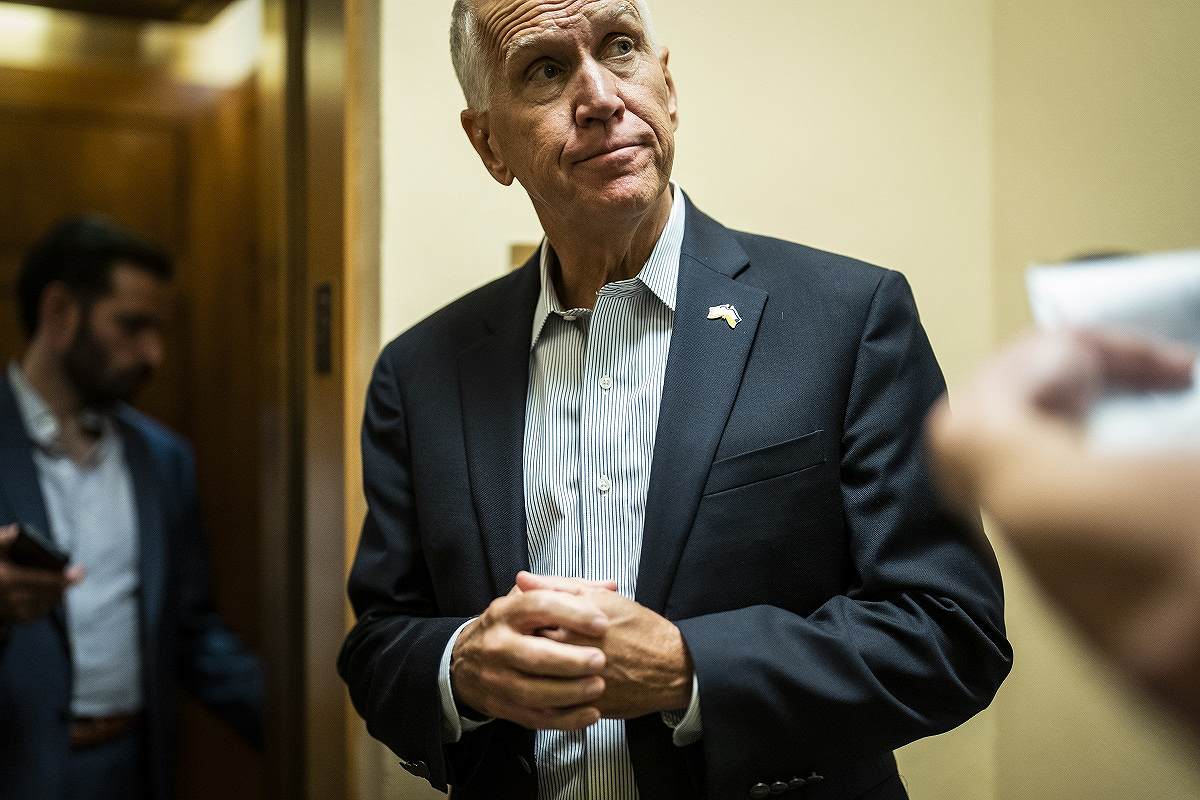
Sen. Thom Tillis (R-N.C.), seen on Capitol Hill in September, released audio of a voice mail he said his office received threatening to “shoot” the lawmaker if he bans TikTok.
14:10 JST, March 22, 2024
As Congress considers legislation that could ban TikTok in the United States, lawmakers are receiving a surge of threatening messages connected to popular video app.
U.S. Capitol Police are investigating an “uptick” in reports of “threats and concerning messages” linked to the TikTok discussions, according to a law enforcement official, who spoke on the condition of anonymity to discuss the sensitive communications.
The exact abundance of such calls is unclear, but one Senate aide said their office has received roughly a dozen violent threats since TikTok began urging users to contact members of the chamber, while a House aide said their office has received multiple calls from people suggesting they will commit self-harm if Congress passes legislation targeting the app. Both spoke on the condition of anonymity to discuss the nature of the outreach.
Capitol Police have contacted the family and school of at least one underage person linked to a reported threat, the Senate aide said.
The app’s fate abruptly regained national attention after House lawmakers unveiled and rapidly passed an aggressive measure to force TikTok’s China-based parent company, ByteDance, to sell off the platform or remove it from the United States altogether.
Since the bill’s introduction, TikTok has repeatedly nudged users to register their opposition to the effort with their congressional representatives with pop-up messages in the app. The tactic has inundated lawmakers’ offices with calls from users, some making violent threats.
“Threats like this are unacceptable and we condemn this in the strongest possible terms,” TikTok spokesman Alex Haurek said in a statement. “Clearly, there are millions of Americans who want to and have the right to speak out against the ban bill that would trample Americans’ constitutional rights of free expression, but we must all do so in a respectful, civil manner.”
In an emailed statement, U.S. Capitol Police said, “For safety reasons, the USCP does not discuss potential investigations.”
On Wednesday, Sen Thom Tillis (R-N.C.) released audio of a voice mail he said his office received threatening to “shoot” the lawmaker if he banned the app.
“I’ll shoot you and find you and cut you into pieces,” said the caller, who sounded young and paused to laugh repeatedly during the 26-second clip.
Tillis said in a social media post that the company’s “misinformation campaign is pushing people to call their members of Congress, and callers like this who communicate threats against elected officials could be committing a federal crime.” TikTok denounced the threat to Tillis.
The law enforcement official said that the threatening calls appeared to be coming from a broad cross-range of people, not only younger users, as some officials have suggested. The rise in such concerning messages has been observed across both the House and the Senate, they said.
TikTok’s Haurek previously told The Washington Post that the prompt displayed on the app was sent only to voting-age users who are 18 or older. The platform has shown users messages that urged them to “speak up” to “stop a TikTok shutdown” and that asked them to enter their Zip code. If they did, the app surfaced information about their representatives.
TikTok first surfaced the messages as a key House committee was set to consider the legislation but redeployed the tactic before the full chamber voted on it. It has since displayed similar notes to turn users’ attention to the Senate, where members are weighing whether to take up the House proposal.
Lawmakers have widely panned TikTok’s move, accusing the company of demonstrating the threat they say it poses by exerting its will over public opinion. TikTok criticized lawmakers for taking issue with constituents speaking out against their proposals.
TikTok has criticized the legislation on Capitol Hill as a thinly veiled attempt to ban the app. Many lawmakers have pushed back, saying they support divestiture, not a ban.
TikTok is not the first company to enlist its users to oppose potential government action. In 2020, ride-hailing services Uber and Lyft sent notifications to users in California urging them to oppose Proposition 22, a ballot initiative allowing the companies to continue classifying their drivers as contractors, not employees.
Top Articles in News Services
-

Survey Shows False Election Info Perceived as True
-

Hong Kong Ex-Publisher Jimmy Lai’s Sentence Raises International Outcry as China Defends It
-

Japan’s Nikkei Stock Average Touches 58,000 as Yen, Jgbs Rally on Election Fallout (UPDATE 1)
-

Japan’s Nikkei Stock Average Falls as US-Iran Tensions Unsettle Investors (UPDATE 1)
-

Trump Names Former Federal Reserve Governor Warsh as the Next Fed Chair, Replacing Powell
JN ACCESS RANKING
-

Producer Behind Pop Group XG Arrested for Cocaine Possession
-

Japan PM Takaichi’s Cabinet Resigns en Masse
-

Man Infected with Measles Reportedly Dined at Restaurant in Tokyo Station
-

Israeli Ambassador to Japan Speaks about Japan’s Role in the Reconstruction of Gaza
-

Videos Plagiarized, Reposted with False Subtitles Claiming ‘Ryukyu Belongs to China’; Anti-China False Information Also Posted in Japan
























